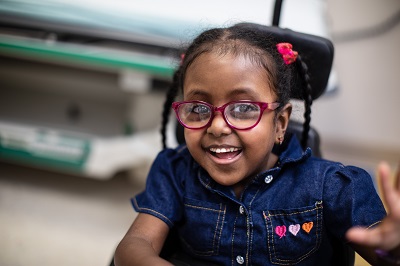

At Children’s National Hospital, we offer novel therapies to our neuromuscular patients, including the following for spinal muscular atrophy:
- Evrysdi™
- Spinraza™
- ZOLGENSMA®
and the following for Duchenne muscular dystrophy:
- AMONDYS 45™
- EMFLAZA®
- Exondys 51
- VYONDYS 53
Our treatment programs not only include our commitment to getting these treatments to patients as quickly as possible, but also incorporate treatment pathways or "roadmaps" to ensure careful follow up, safety monitoring and evaluation of function after the initiation of these therapies.
Caring for Your Child's Heart
Our nationally recognized leaders in the evaluation of cardiomyopathy in muscular dystrophies carefully evaluate children in our neuromuscular program with EKG, echocardiogram and cardiac MRI. The use of advanced cardiac imaging for children with certain muscular dystrophies has allowed for earlier detection of findings such as fibrosis, and therefore the earlier administration of cardioprotective medications. Additional cardiac testing may include long term cardiac monitoring when an abnormal heart rhythm may be suspected.
Immune Therapy
We have an active immune therapy program for the treatment of children and adolescents with myasthenia gravis, Guillain-Barré Syndrome and Chronic Inflammatory Demyelinating Polyneuropathy (CIDP). Patients with inflammatory muscle diseases (eg: myositis) are closely followed by colleagues in our Rheumatology program for initiation of disease modifying therapies. Our team works closely with studies and trials on-site at the National Institutes of Health, especially in studies focusing on genetic therapies and diagnostics.
Our Treatments and Services
- Braces, splints, Angel Arms and WREX
- Positioning aids to help children sit, stand or lie down
- Durable medical equipment
- Occupational therapy
- Physical therapy
- Surgical interventions (eg: for contractures and for scoliosis)
- Speech and swallowing therapy
- Nutrition counseling – including management for supplemented tube feedings (Nasogastric or gastric tube feedings)
- Augmentative communications
- Pulmonary function studies
- Sleep studies
- Psychological counseling
- Echocardiogram/cardiac MRI
- Bone density assessment (as well as targeted therapy when indicated)




